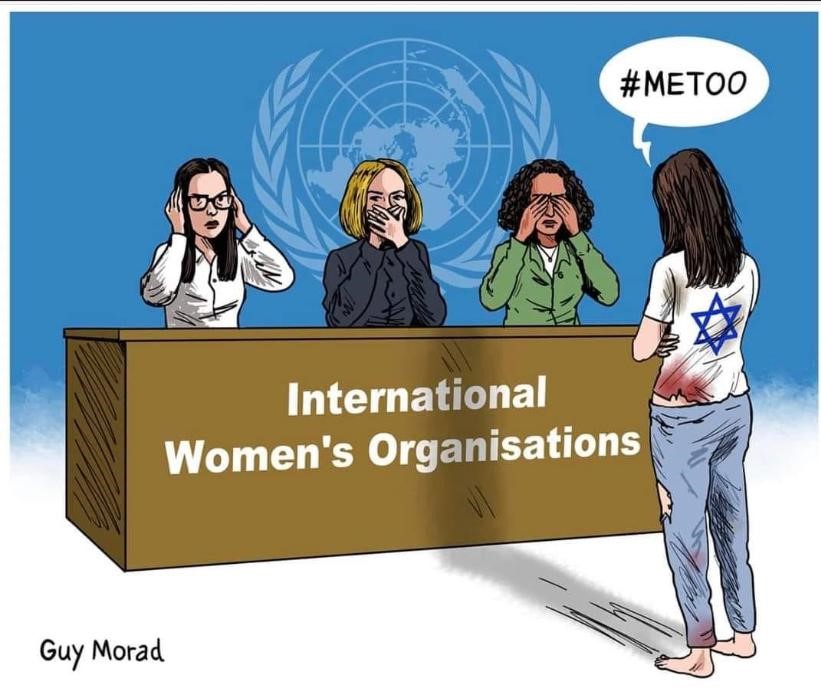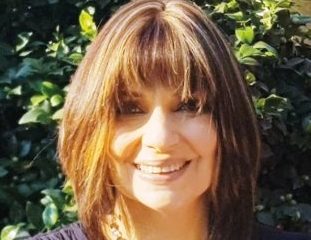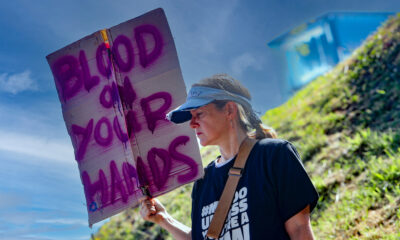
Featured Item

‘Silence equals complicity’ in fight against sexual violence
The weaponisation of rape and sexual violence at times of war and conflict is sadly nothing new. Yet the denialism, silence, and victim-blaming that has accompanied the brutal sexual atrocities perpetrated by Hamas in Israel on 7 October is horrific, said a panel of experts at a recent Women’s Action Campaign South Africa (WACSA) webinar.
Brutal gang rape. Broken pelvises. Genital mutilation. These and other horrific acts were perpetrated against Israeli women, children, and men on 7 October – all livestreamed by the terrorists themselves. Sadly, very few lived to tell their stories. Around the world, and particularly in South Africa, a country plagued by one of the highest global rates of gender-based violence (GBV), the lack of discussion about and support for the victims of what has been reported as “systemic sexual violence” has been jarring.
So said the panel of experts who participated in a discussion moderated by renowned South African broadcast journalist Annika Larsen on 15 April.
“I see what happened on 7 October as a ‘life-quake’, which encapsulates the horrific realities of genocide, a seismic event that shatters lives and communities,” said panellist Danielle Ofek, an American-based Israeli who started the #MeToo_Unless_UR_a_Jew campaign in response to the global silence surrounding the sexual violence on 7 October.
Hamas committed these attacks with a clear goal in mind: the genocide of the people of Israel and eradication of the land of Israel, she said. What’s more, the narrative of disbelief and victim-blaming in the region started decades before 7 October.
“Today, we can see clearly how international institutions contribute to upholding and continuing this false narrative,” Ofek said. “For example, the United Nations (UN) and UN Women are taken as the gold standard in terms of human rights and women’s advocacy in the assumption that they are unbiased.
“Yet, as we’ve seen before and after 7 October, their leadership carries strong biases. You would expect an organisation that champions women’s rights to be the first to call out gang rape and GBV.” Yet it took the UN five months to write a report on the sexual violence perpetrated on 7 October, which still distorted the truth, she said.
These organisations also consistently remain silent with regards to the hostages, Ofek said. “The hostages are probably going through sexual assault as we speak. It’s unbelievable.” Asked for the reason for their silence, Ofek said the leadership had an antisemitic agenda.
“South Africa is among the top three rape capitals in the world, so we live in a society where these types of acts are almost normalised,” said Rozanne Sack, the Johannesburg-based co-founder and director of anti-abuse organisation Koleinu SA and a WACSA member. Sack, one of the panellists, said the fact that such a country was silent around sexual violence on 7 October was “unconscionable”.
“This minimisation and denialism equates to silence for victims. If you say that these barbaric acts were part of resistance, that’s silence for victims. If you have a mentality that only people living in underprivileged or difficult circumstances are legitimate victims, and Israelis can therefore never be seen as legitimate victims, that also represents silence for victims all over the world. That silence equals complicity to a certain extent.”
Sack referenced a poll conducted by WACSA that explored attitudes towards rape and GBV in South Africa. “What was shocking was that one in four South Africans believe that rape can be justified in certain circumstances, with these results spread equally between men and women,” she said.
Asked why women would believe this, Sack said a factor was the entrenchment of patriarchy and toxic masculinity in certain cultures. “In some cases, the woman feels she’s almost to blame, accepting the narrative that she did something to provoke the attack and that what happened to her is justified. Victim-blaming [internal and external] is a huge part of what keeps women silent. They are also often financially dependent on their partners.”
That’s why re-establishing control for survivors is so important, said panellist Dr Mushira Aboo Dia, an obstetrician and gynaecologist at Hadassah University Medical Center in Jerusalem and a sexual-abuse specialist at Hadassah’s Bat Ami Center. Here, the woman determines what she wants to discuss, and whether she wants the police involved.
Though the centre didn’t work with 7 October survivors, Aboo Dia pointed out how difficult it was for those who have been through such traumatic events to talk about their experiences. “They might relive the horrific event multiple times, which can cause re-traumatisation, which later on can play a role in the development of post-traumatic stress disorder.” Research shows that secondary traumatisation can be even more damaging to a victim than the act of the abuse itself, according to Sack.
Additionally, when a survivor experiences victim-blaming, it can affect her chances of rehabilitation, said Aboo Dia. Being believed is a crucial part of healing.
“They need us to give them time to talk about what happened, even if it takes months,” she said, referring to the released hostages. This was the case for freed hostage Amit Soussana, who recently spoke to the New York Times.
When the media is almost salivating to get the traumatic details from survivors, Larsen said, it makes it that much harder to speak up. In a world where the burden of responsibility seems very high for victims of sexual violence, believing women is vital, she said.
That’s why, said Ofek, it was so disturbing to see how international organisations, which have in their mission statement believing all women, reacted to sexual violence on 7 October. “It’s terrifying how violence against Israeli women has been denied, ignored, contextualised and even politicised,” she said. “The crimes of 7 October were a crime against humanity. It should be a global concern. Rape isn’t resistance; sexual violence is never acceptable. When brutal sexual violence is swept under the rug in our region, you embolden the perpetrators and enable it to continue happening elsewhere.”











SM Smith
April 22, 2024 at 3:39 pm
Hypocritical and outright antisemitic United Nations, which should be completely abandoned as most of the countries are nothing more than dictatorships oppressive nations, radical haters of other nations. And she, everyone of those leaders of those woman rights organizations at the United Nations need to be held accountable. They need to be held accountable in the quart of law, and they need to be addressed and they need to be named and shamemed, and these organizations need to address what is happened, and this should never be forgotten. In fact, statues should be built, so people do not forget how the so-called protector of the world turned on the woman of the world! Absolutely unacceptable for these people to get away with us. They need to be addressed and they need to be jailed if it’s possible.